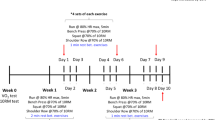Summary
The influence of exercise at high temperature on adult males’ routine blood indexes and biochemical indexes and the expression of HSP72 in peripheral blood lymphocytes (PBLs) was studied in order to provide theoretical ground for health supervision of adults receiving exercise at high temperature. 180 adult males were selected and divided into exercise group and control group, in which the exercise group was subdivided into subgroup 1 and subgroup 2 receiving exercise at high temperature in the afternoon and in the morning, respectively. Peripheral venous blood was phlebotomized before and after the exercise to examine routine blood indexes and blood biochemical indexes. The expression levels of HSP72 in PBLs were detected by flow cytometry. The results showed that the routine blood indexes and biochemical indexes in each group were within the range of normal values of male adults. There was no significant difference between each exercise group and control group in indexes before exercise. After exercise, the expression levels of HSP72 in PBLs in exercise groups were higher than those before exercise, and HSP72 expression levels in subgroup 1 were obviously higher than those in subgroup 2 and control group. The contents of ALT, urea, Na+, Cl−, Ca2+ and K+ in subgroups 1 and 2 were lower than those in control group, but CK level was higher than in control group (P<0.05). The contents of Na+ and Cl− in subgroup 1 were relatively lower than those in subgroup 2 (P<0.05). It was concluded that while receiving exercise at high temperature, adult males’ HSP72 levels in PBLs could be increased and the biochemical indexes changed. Attention should be paid to health supervision to avoid obvious body injuries at high temperature.
Similar content being viewed by others
References
GBZ 2.2-2007, Limit Values for Occupational Exposure to Harmful Factors at Workplaces (Chinese). Part 2: Physical Factors, 2007.
Shen G X, Zhou R. Modern Techniques of Medical Immunology (Chinese). 2nd ed. Wuhan: Hubei Science and Technology Press, 1998,377–390.
Chen W B, Pan X L, Kang X X et al. Diagnostics (Chinese). 6th ed. Beijing: People’s Medical Publishing House, 2007.
Ma X H, Zou F, Chen J et al. Influence of compound factors at high temperature on electrolyte and relevant hormone levels in blood of adult males. Med J Chin PLA (Chinese), 1999,17(5):329–332
Wu T C. HSPs antibody levels in blood plasma of workers exposed to high temperature and CO. Chin J Indust Hygi Occupat Dis (Chinese), 1995,13(1):1
Tavaria M, Gabriele T, Kola I et al. A hitchhicker’s guide to the human hsp70 family. J Cell Stress Cha, 1996,1:23–28
Favatier F, Bornman L, Hightower L E et al. Variation in hsp gene expression and hsp polymorphism: do they contribute differential disease susceptibility and stress tolerance. J Cell Stress Cha, 1997,2:141–155
Chen P J, Wei Y, Yang D H. Effects of Different exercise intensities on the expression of heat shock protein 72 mRNA in myocardium of rats. Chin J Sports Med, 2004,23(6):624–628
Wang Z Z, Wang C L, Mao Z C et al. A study on relationship between plasma heat stress protein 70 and cytokine in patients with heat apoplexy. Chinese Journal of Preventive Medicine. 2000,34(1):11–13
Liu P, Zhang X L, Wu T C. Study on the relation between heat shock proteins and heat stress of marcher with load in dry-heat desert. China Public Health (Chinese), 2001,17(3):213–214
Author information
Authors and Affiliations
Corresponding author
Rights and permissions
About this article
Cite this article
Tang, Z., Weng, S., Peng, S. et al. Influence of exercise at high temperature on blood biochemical indexes and HSP72 expression in adult males. J. Huazhong Univ. Sci. Technol. [Med. Sci.] 28, 504–507 (2008). https://doi.org/10.1007/s11596-008-0503-0
Received:
Published:
Issue Date:
DOI: https://doi.org/10.1007/s11596-008-0503-0




